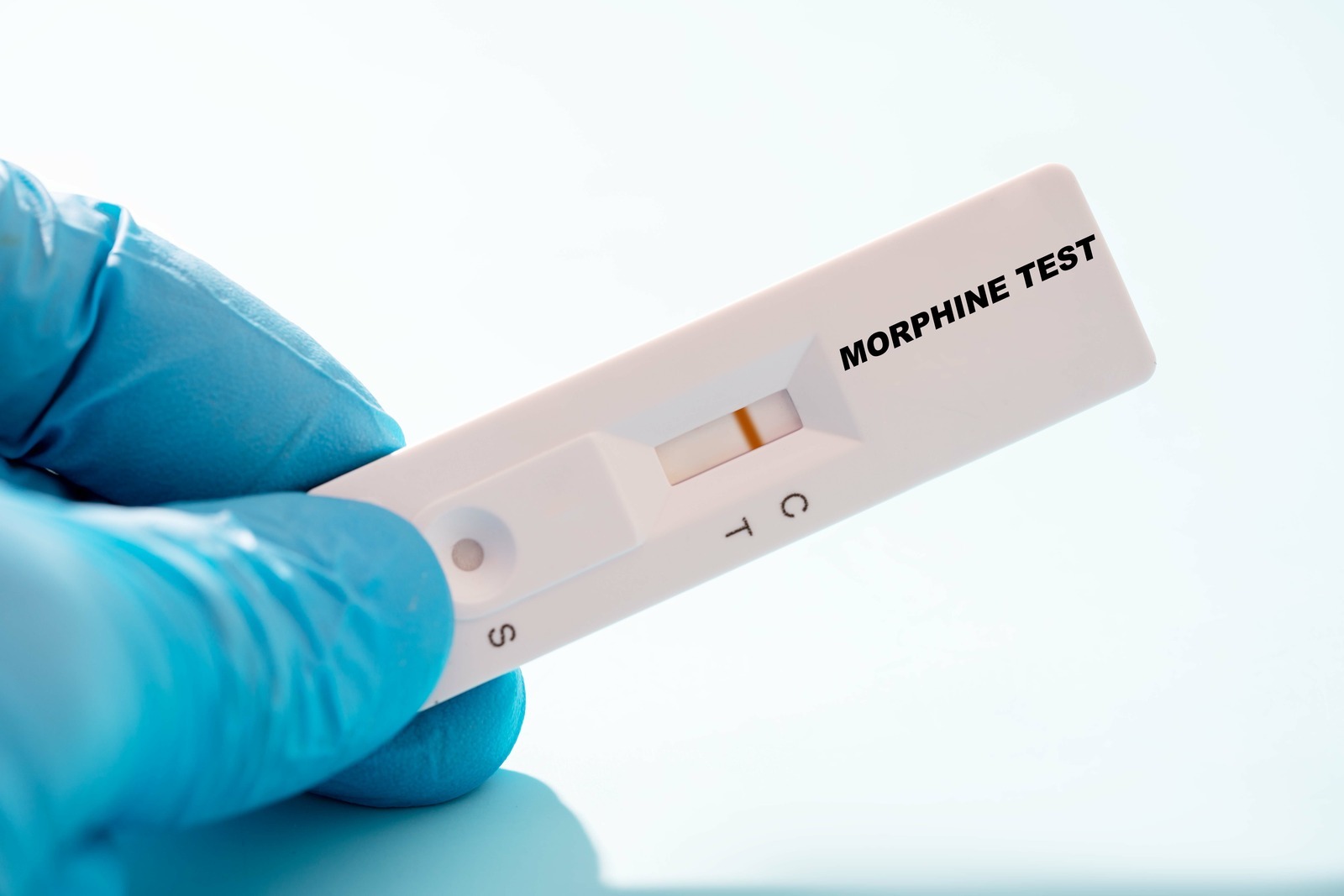How Long Does Morphine Stay in Your System? Morphine’s Effects and Drug Tests

Key Points
- Morphine is an opioid painkiller used to treat moderate or severe pain, such as cancer pain or post-surgical pain.
- The effects of morphine last between 4-6 hours and 8-12 hours, depending on the formulation.
- Morphine's clearance from the body typically takes longer than 12 hours, with its metabolites possibly detectable for much longer periods depending on various factors, including the individual's metabolic rate, age, kidney function, dosage, and frequency of use.
- Morphine may be detectable in drug tests anywhere from 3 days to 90 days, depending on the test.
Morphine is an opioid that’s prescribed to treat moderate or severe pain that doesn’t respond to other medications. The effects of morphine can come on quickly and last for hours before you need another dose for pain management, but the drug stays in the system for much longer.
Generally, morphine’s effects last 4 to 6 hours – 8 to 12 hours with extended-release formulas – but it takes more than 12 hours after last use to clear the body. Morphine may be detectable in drug tests for longer periods, however.
What Is Morphine?
Morphine is a narcotic painkiller that’s part of the opioid class. It’s derived from the poppy plant and blocks pain signals from reaching the brain. Morphine may be prescribed to treat moderate to severe pain that hasn’t been managed effectively with other medications, such as cancer pain or pain from major surgeries.
Some of the common brand names for morphine include MS Contin, Oramorph SR, Morphgesic, Arymo ER, and Sevredol. It comes in tablet, capsule, liquid, suppository, epidural, and nebulized forms.
Morphine has a powerful effect on pain and the reward center of the brain, giving it a high potential for misuse and painkiller addiction. It’s a Schedule II substance because it has legitimate medication uses and a high risk of dependency.
How Quickly Does Morphine Work?
The amount of morphine used for pain relief depends on the individual, the nature of the pain, the dosage, and the method of administration. Depending on the product and method of administration, the effects come on rapidly or slowly.
By mouth, morphine can start to take effect after about 30 minutes.[1] Once consumed, it reaches peak concentration in the bloodstream in about 60 minutes.
When morphine is injected into a vein, the effects can come on much faster – typically 1 to 2 minutes.[2] Conversely, extended-release formulations can take longer to reach peak concentration in the bloodstream.
With morphine and many other drugs, doctors usually begin with the lowest possible dose, increasing it gradually until you feel the effects. People who have never taken opioids may need a lower dose of morphine initially to get pain relief.
However, morphine use can lead to tolerance, which is when it takes higher amounts of the drug to feel the same effects. If this occurs, you may need higher doses or different types of pain medication to manage your symptoms. Don’t increase your morphine dose without discussing it with your doctor.
How Long Do Morphine Effects Last?

Once morphine hits peak concentration – and peak pain relief – the effects will begin to wear off. This usually happens in about 4 to 6 hours. Doctors may prescribe morphine at a single dose every 4 to 6 hours to ensure consistent pain relief.
With extended-release formulas, the effects of morphine can last for 8 to 12 hours. This may be preferred for some people to have nonstop relief rather than fluctuations in their symptoms.
How Long Does Morphine Stay in the System?
No matter how long morphine effects last, the morphine itself may be detectable in the system for a longer period. The half-life of morphine, which is the time it takes for the body to eliminate half of the drug, is about 2 to 4 hours.
The half-life of morphine and other medications can vary by individual, however, as everyone metabolizes medications differently. Morphine and its metabolites may be detectable in the body for significantly longer than 12 hours after the last dose. The drug’s half-life is about 2 to 4 hours, but complete elimination from the body takes much longer.
Generally, morphine is detectable:[3]
- For up to 36 hours after the last dose in a urine test
- For up to 2 days after the last dose in a blood test
- For up to 90 days after the last dose in a hair test
Keep in mind that these are general guidelines. There are several factors that may affect how long it takes for morphine to be eliminated in the body, including:
- Age
- Weight
- Metabolism
- Body fat percentage
- Liver and kidney function
- Dosage
- Certain medical conditions
- Other medications
- Whether the person has taken any opioids before
- The length of morphine use
- Genetics
In addition, if you consume alcohol with morphine, the effects can be amplified. It’s also incredibly dangerous to combine alcohol and morphine, as they’re both depressants. Taking them together can lead to a deadly overdose.
Other medications may interact with morphine, including other opioids like heroin or methadone, depressants like diazepam and alprazolam, antihistamines, certain antacids, and monoamine oxidase inhibitors (MAOIs).
Another factor that can influence the onset of morphine’s effects is if you alter the drug in some way, such as crushing or chewing a tablet. This can increase the drug’s concentration in the body quickly, leading to overdose and possible death.
Morphine Withdrawal
Morphine use, even when prescribed and taken as directed, can cause tolerance and dependence. This is when the body becomes used to the presence of the drug and needs it to function properly.
If you stop taking it or reduce your dose abruptly, you may have intense withdrawal symptoms. Some of the symptoms of morphine withdrawal include restlessness, irritability, anxiety, heavy sweating, muscle spasms, back pain, insomnia, diarrhea, vomiting, rapid breathing and heart rate, and high blood pressure.[4]
Doctors typically reduce the dosage over time to minimize withdrawal symptoms, which is known as tapering or “weaning off” of a drug.
Morphine Abuse and Addiction
Though commonly prescribed and used safely, morphine is a potent drug with a potential for misuse, abuse, and addiction. If you’re misusing or abusing morphine and concerned about a drug test, it’s crucial that you don’t try to stop cold turkey on your own.
Morphine withdrawal isn’t directly dangerous, but it can be intense and uncomfortable. Severe symptoms and cravings put you at a risk of relapse to relieve the discomfort. If you do relapse, there’s an increased risk of a fatal overdose.
Medical detox is an important step in getting off morphine safely and effectively. You will have medical supervision to manage your taper schedule and symptoms to keep you as safe and comfortable as possible while morphine clears your system.
Detox is important for withdrawal, but it’s not usually enough to treat addiction on its own. After detox is complete, it’s best to start an addiction treatment program in an inpatient or outpatient setting. While each treatment plan is tailored to your individual needs, these environments provide support, structure, and appropriate treatments like behavioral therapy, psychotherapy, and holistic therapies like music therapy to address the underlying causes of addiction.
Get Help for Morphine Abuse or Addiction
Morphine is a legal drug with a valid prescription, but it still carries a high potential for abuse and addiction. If you or a loved one is struggling with morphine abuse or addiction, medical detox and an addiction treatment program can help you manage withdrawal and work through the addiction and the factors that contribute to it.
Frequently Asked Questions About Morphine
How Does Morphine Work?
Morphine is in the opioid class and works in the central nervous system to block pain signals to the rest of the body. While it can help with severe pain, this often includes other effects like slow or shallow breathing.
What Is Morphine’s Half-Life?
A drug’s half-life is the time it takes for the amount of the drug’s active compound to be reduced by half. Morphine’s half-life is about 2 to 4 hours, but this can vary.
How Can I Get Morphine Out of My System Quickly?
Whether you are worried about possible addiction or you’re concerned about a drug test with morphine, it’s not recommended to try to stop cold turkey or detox alone without professional help. While morphine withdrawal is primarily not life-threatening, it can present significant physical and psychological challenges.
In some cases, complications from withdrawal symptoms, such as severe dehydration due to vomiting and diarrhea, can pose health risks. Therefore, it’s crucial to undergo withdrawal under medical supervision to ensure safety and manage symptoms effectively.
At-home detox kits and remedies are on the market and claim to help you clear a drug from your system quickly to beat a drug test, but these products are unproven, unregulated, and may not be safe. If you want to get off morphine, it’s best to start with a medical detox program.
We take our music-focused treatment for addiction very seriously, so we are going to hold our content to the same precision standards. Recovery Unplugged’s editorial process involves our editing safeguard and our ideals. Read our Editorial Process.
Sources
[1] Journal of Education & Teaching in Emergency Medicine. (2022, July 15). Morphine Equianalgesic Dose Chart in the Emergency Department. PMC. Retrieved from https://www.ncbi.nlm.nih.gov/pmc/articles/PMC10332699/
[2]Vahedi, H. S. M., Hajebi, H., Vahidi, E., Nejati, A., & Saeedi, M. (2019b). Comparison between intravenous morphine versus fentanyl in acute pain relief in drug abusers with acute limb traumatic injury. World journal of emergency medicine. https://www.ncbi.nlm.nih.gov/pmc/articles/PMC6264977 /
[3] MediLexicon International. (n.d.). How long does morphine stay in the system?. Medical News Today. Retrieved from https://www.medicalnewstoday.com/articles/how-long-does-morphine-stay-in-the-system#timeline
[4]U.S. National Library of Medicine. (n.d.). Morphine: Medlineplus drug information. MedlinePlus. https://www.accessdata.fda.gov/drugsatfda_docs/label/2012/022195s006lbl.pdf


